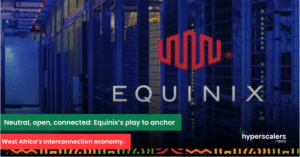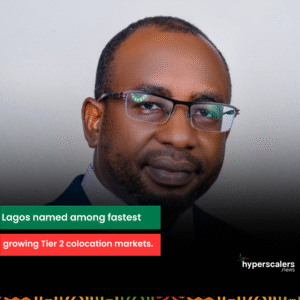By Sandile Dube
Sandile Dube is the Managing Director of Equinix in South Africa.
Africa represents one of the most attractive expansion opportunities available to multinational tech companies today. The continent has a population of more than 1.4 billion, and more than half that number is currently excluded from the digital economy.[1] Africa also has the youngest population of any continent: An estimated 70% of sub-Saharan Africa is under the age of 30.[2] This means that investing to connect the unconnected in Africa today could drive economic benefits for decades to come.
Since South Africa has one of the highest rates of internet penetration of any country in sub-Saharan Africa, it’s a particularly attractive entry point for companies looking to expand into the continent, and these companies have begun to invest accordingly.
Due to its strategic location touching multiple oceans, South Africa has traditionally boasted a significant network of subsea communication cables connecting it to other countries and continents. Recent developments have cemented the country’s status as a subsea landing hub. For instance, the new Equiano cable system connects the west coast of Africa with Europe.

Equinix aims to support digital growth in South Africa
Equinix has already invested $350 million to help improve digital infrastructure in Africa, with an additional $390 million in new projects announced for the next five years. This includes our first expansion into South Africa: our new data center in Johannesburg, JN1, scheduled to open in mid-2024.
We’ve entered the country with the intention of supporting the growth of the digital economy. To achieve this, we aim to serve both South African companies looking to expand globally and multinationals looking to enter the country for the first time. The enthusiastic response we’ve seen from potential customers proves that there was pent-up demand for colocation services inside highly interconnected data centers. By the time the Equinix JN1 data center opens next year, we expect that a significant majority of the available capacity will already be acquired.
Many of these customers recognize that the value Equinix offers extends far beyond traditional colocation. When customers deploy at Equinix, they get access to our digital ecosystem—including thousands of enterprises and cloud, network and IT service providers—as well as our global platform of data centers in 70+ metros on six continents. Instead of offering just a place to host your servers, Equinix can help you build differentiated digital infrastructure that drives business value.
We have invested in South Africa because we believe in its potential and are committed to contributing towards its growth. It’s a country that already has a robust and resilient economy, not to mention relatively strong digital infrastructure. However, we also recognize there are challenges facing the country, and that overcoming those challenges could help the South African digital economy grow even larger and more vibrant than before.
Overcoming the digital divide in South Africa will take a team effort
One challenge facing South Africa today is the digital divide that stands in the way of affordable, equitable internet access throughout the country. Helping to address this divide is one way that we aim to grow our own business in the country while also making a positive impact on society.
On paper, the digital divide in South Africa is not as pronounced as it is in some other African countries, but that doesn’t mean it’s an issue we can ignore. According to Statistics South Africa’s General Household Survey, more than 75% of South African households have some form of internet access.[3] However, only about 13% have a fixed internet connection in their own home.
It’s also clear that there’s a digital divide between urban and rural areas within South Africa:
-
- In metropolitan areas, 21.4% of households have fixed internet access at home, compared to only 1.6% of rural households.
-
- In metropolitan areas, 74.1% of households can access the internet using mobile devices, compared to only 61.1% of rural households.
The digital divide in South Africa has many causes, so there won’t be any single easy solution. Instead, it’s going to take partnerships between leading industry players to expand services where they are needed and make them affordable for people living there. Investments from multinational companies certainly help, but there’s also a lot of investment coming from within the country. For instance, South African telco providers have made total investment commitments of more than $10 billion over the last five years to build out the country’s telecommunications network, according to the South African government.[4]
At Equinix, we’re proud to provide a platform on which ecosystem partners—both local and international—can come together to work toward the shared goal of closing the digital divide in South Africa. Together, we can optimize South African digital infrastructure and help create a virtuous cycle:
-
- Better internet connectivity means that providers will be able to offer more digital applications to more customers throughout the country.
-
- In turn, this will increase demand for devices and faster connectivity.
-
- This will create an incentive for networks and device manufacturers to expand.
-
- This will help make internet access affordable to a wider portion of the population, thus starting the cycle over again.
When we close the digital divide, everyone will benefit, and the digital economy will grow every step of the way.
Addressing the skills gap helps both businesses and citizens in South Africa
Since many South Africans don’t have reliable internet access, they may never have the opportunity to develop basic digital literacy. This skills gap will hamper the further growth of the country’s digital economy.
South Africa’s unemployment rate is among the highest in the world today. The official rate for Q3 2023 was 31.9%, and the number is even higher among younger people.[5] While this fact is unfortunate, I believe that it also speaks to the size of the digital opportunity in South Africa. If we can invest in the people of South Africa in the same way we’re already investing in its digital infrastructure, we could bring millions of new people into high-tech jobs.
The Equinix 2023 Global Tech Trends Survey (GTTS) found that there is significant demand for skilled digital workers that may be going unmet. In the survey, 75% of South African IT leaders said that they plan to increase the size of their IT teams in the next 12 months. Meanwhile, 36% said a lack of available talent is among the biggest skills challenges facing the tech sector as a whole.
These numbers show that if we provide digital skills training to more people in South Africa, we could curb unemployment while also helping South African companies find the talent they need to compete in the global economy.
Just like with the digital divide, there’s no easy way to solve this problem, and no single entity can do it working alone. It’s going to take government agencies, educational institutions, NGOs and businesses all working together to identify the underserved population and figure out the best and most efficient ways to offer them training opportunities.
Part of this multifaceted strategy should include providing training for students in primary schools. Logically, this is an effort that will take many years to pay off. However, South Africa won’t be able to compete in the future global economy unless it can ensure digital inclusion for children today. To put it simply, we can’t afford not to invest in digital literacy for the next generation of South Africans.
Regulatory challenges could hamper digital growth
At the AfricaCom event last month, the issue of government regulation seemed to be top of mind for many attendees. In fact, when I attended a panel discussion featuring Mondli Gungubele, South Africa’s Minister of Communications, it was clear that he and everyone else in the room recognized the importance of getting regulations right. In my mind, getting it right means doing what needs to be done to protect the citizens and interests of South Africa, but without placing unnecessary burdens on the companies that do business in the country.
When we think about ways to optimize South African digital infrastructure and accelerate the growth of the digital economy, government regulators need to be willing partners in making that happen. While we assume that regulators from South Africa and other African countries have good intentions and want to see our industry thrive, we still face regulatory challenges that could prevent us from reaching our full potential.
This fact shows up in data from the Equinix GTTS. In the survey, 67% of South African IT leaders said they lack the in-house expertise to keep up with stricter data sovereignty regulations. We can also see how regulatory complexity factors into business’s expansion plans: 53% of global IT leaders said that if a country or region they were planning to expand into enacted stricter data sovereignty laws, they would make major changes to their expansion plans or cancel them altogether.
As a member of the South African business community, we look forward to working alongside our government partners to do what’s in the best interest of the country and its digital economy. We remain open to participating in any forum that might help us communicate some of the regulatory challenges we currently face in South Africa and create a plan to address those challenges.
Equinix provides the platform to grow South Africa’s digital future
Although Equinix is still new to South Africa, we’re excited about the progress we’ve made so far. Last month, we announced that the Johannesburg Internet Exchange Point (JINX) will be available in our new JN1 data center in Johannesburg when it launches next year.
This means that service providers that want to exchange internet content in South Africa will be able to do so from within the Equinix facility. Together, JINX and Equinix will provide public peering services that support the development of digital ecosystems, which in turn will drive the growth of the digital economy.
This partnership is just the first of many that Equinix will announce with leading service providers in the months to come before JN1 opens its doors. We believe in the digital future of South Africa, and we’re proud to offer a platform where partners can come together to make that future a reality. We invite enterprises or service providers that share our vision of driving digital growth while also making a positive contribution to society to join us in Johannesburg and see how we can scale our impact together.
To learn more about the Equinix approach to building interconnected, vendor-neutral digital infrastructure in locations around the world, read our vision paper The future of digital leadership.
Sandile Dube is Managing Director for Equinix, South Africa. He was previously Managing Director, South Africa at Hewlett Packard Enterprises (HPE) and worked at Dimension Data, South Africa.
[1] Number of people who do not use the internet in Africa as of October 2022, by region, Statista, October 2022.
[2] Young People’s Potential, the Key to Africa’s Sustainable Development, United Nations Office of the High Representative for the Least Developed Countries, Landlocked Developing Countries and Small Island Developing States.
[3] General Household Survey 2022, Statistics South Africa, August 17, 2023.
[4] New investments to propel our digital economy forward, South African Government, April 17, 2023.
[5] Media Release: Quarterly Labour Force Survey Q3 2023, Statistics South Africa, November 14, 2023.





